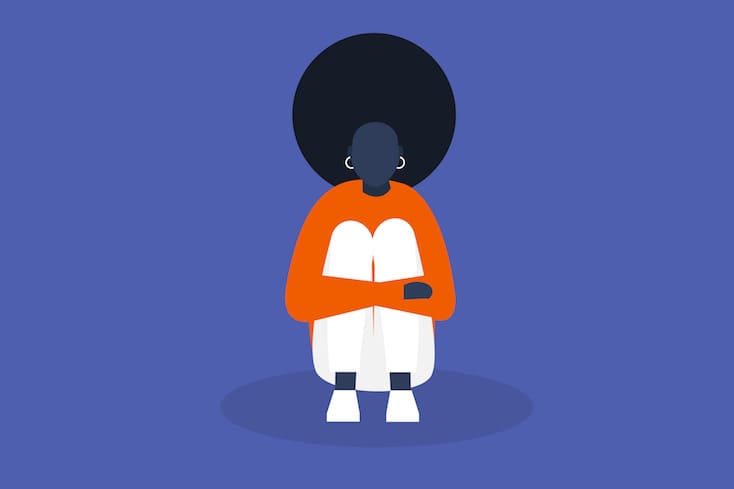March 15, 2021
By DeWanda Wise

As COVID-19 was just beginning to sweep through the U.S. in March, a friend of mine asked, “What’s up with the culture’s response to Corona? Such a vibe out there that it’s not a problem.”
By “the culture,” he was referring to Black people. That friend was baffled that many Black people either believed COVID-19 was built in a lab or weren’t taking it seriously at all.
The first reason, I told my friend, is a practical one: Survival is in our DNA. Mustering up the mental fortitude to continue to provide for your family is a herculean task under what were already extreme circumstances for many Black people in America, so minimizing the threat of COVID-19 became a means of survival.
The other reality is that the sullied relationship between Black people, governance and health care is undeniable.
There are many historical situations that have contributed to our mistrust. One example includes a famous psychiatrist, Samuel Cartwright, who believed that slavery was a natural state for Black people. In 1851, he published a report where he coined two “psychiatric” disorders: draeptomania and dysaesthesia aethiopica. The only criteria for these “diagnoses” was to be a slave who ran away or resisted hard labor.
The Black community’s reluctance to trust both our government and our health care system is not only understandable, it is justified, especially as these discriminatory practices continue today with the present parallel atrocity: the criminalization of Black people with mental illness.
988 as a Tool for Diversion
In a heart-wrenching report from 2014, “Impact of Disproportionate Incarceration of and Violence Against Black People with Mental Health Conditions in the World’s Largest Jail System,” Los Angeles was the case study for what we all now know is a national crisis. The study cites a few striking details:
- The lack of access to mental health care within the Black community creates a cycle of “more severe symptoms, greater criminal involvement and more frequent arrest.”
- Black people are overrepresented among those with mental illness who are arrested and incarcerated.
- While most criminal offenses committed by people with mental conditions are nonviolent, their incarceration often worsens their conditions, resulting in higher rates of trauma, criminality and recidivism.
Often, calling 911 for a mental health emergency leads to unhelpful, if not tragic, outcomes for Black people. Police are dispatched and charged with handling a situation they might not be trained for, resulting in an entanglement with the criminal justice system that never should have happened in the first place.
These harsh realities demonstrate that we need better access to care and crisis services for Black people with mental illness. One way we do that is by giving communities another option to call when a neighbor or loved one is experiencing a mental health crisis.
Years of activism for an alternative to dialing 911 for mental health emergencies has finally paid off: On July 16, 2020, the FCC formally established “988” as the “911” for mental health emergencies. I cannot express what a tremendous relief 988 has the potential to be for Black people.
NAMI is continuing to work with Congress to ensure that everyone, especially the most vulnerable, will have effective crisis response services when 988 goes live in two years. Advancing 988 means diverting people from justice system involvement to crisis services and coverage for care. NAMI is also advocating to ensure that people who are Medicaid-eligible can be covered 30 days before they reenter the community after incarceration instead of falling through the cracks. This is huge.
In the next two years, building out a sustainable mental health infrastructure in our communities will prove crucial, to say the least. Conversations on diverting funding from police to other community services were always in acknowledgment of mental health care and other services that have long been ignored in our country.
To that end, NAMI has an excellent illustration on the ecosystem required for long-term mental health care in the report, “Divert to What? Community Services that Enhance Diversion.” The pillars are outpatient care, social support, crisis services and inpatient care. At the heart of all four are peer and family support, which can presently be found through NAMI Connection, NAMI Peer-to- Peer and NAMI Family-to-Family. When 988 finally goes live, let’s all be mobilized and ready to greet it.
I’ve spoken on mental health stigma in the Black community for years, both personally and publicly. The truth is, on the other side of stigma is a shared experience wherein our needs — mental health and otherwise — have not only been unmet, but responded to with physical, emotional and psychological violence and neglect.
I am hopeful that 988 advocacy will have positive rippling effects. We can no longer afford to be pessimistic or even complacent about our futures. Radical change requires radical idealism. The intersectionality of racism, mental health, law enforcement, homelessness and often self-medication via illicit drug use has decimated the Black community. It is a crime against humanity that has callously been ignored for far too long.
We’ve unearthed the gaping holes in our system. It’s beyond time to fill the gaps with a better system for all of us.
DeWanda Wise is an actress/producer, activist and NAMI Ambassador.
Note: This article was originally published in the Fall 2020 issue of the Advocate.
Submit To The NAMI Blog
We’re always accepting submissions to the NAMI Blog! We feature the latest research, stories of recovery, ways to end stigma and strategies for living well with mental illness. Most importantly: We feature your voices.
LEARN MORE